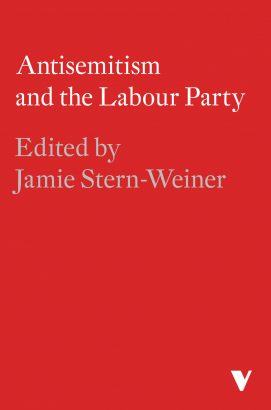Antisemitism and the Labour Party is an anthology of reissued articles and essays which sets out to provide a ‘sober examination of the strange events that have warped British politics since 2015.’ Most of the pieces were originally published online between 2017 and 2019, although one, an article by Richard Kuper on the University and College Union, dates back to 2011. Also included are 21 testimonies by members of the Labour Party. The collection offers an instructive sampler of a whole battery of arguments and rhetorical moves – some of them mutually contradictory – which have been used to counter or dismiss allegations of antisemitism on the left.
The editor, Jamie Stern-Weiner, sets the tone for the anthology in his lurid and tendentious introduction. Not content with asserting that the allegations against Corbyn’s Labour have ‘no basis in fact’ and are prompted by transparently partisan motives, he conjures up a picture of the crisis as something monstrous and sinister – ‘Like a creature from a horror film, the “Labour antisemitism” controversy just won’t die’ – before aligning it with both the Salem Witch Trials and McCarthyism.
One of the problems with Antisemitism and the Labour Party is a tendency to cherry pick its examples, avoiding the most challenging allegations. Before I began to read this collection I made a brief note of some of the key episodes which had led to such a lack of confidence in Jeremy Corbyn’s ability to identify and tackle the problem of antisemitism. I included some which were more amenable to softening or mitigation – and some which it was more difficult to excuse or explain. Two of the most egregious were Corbyn’s associations with Raed Salah and with Paul Eisen’s group Deir Yassin Remembered. Not a single mention of either of these was included in any of the collection’s 20 essays.
The impact of such omissions on the reader is highly significant. In ‘Corbyn Under Fire’, Daniel Finn notes that the Labour Party ‘is said to have become a party “for the many, not the Jew”, with a leader who winks approvingly at bullies and bigots’. The reader who doesn’t know the full picture will share Finn’s own implied ridicule and incredulity at a position which seems at best paranoid, at worst knowingly malign. However other readers may well think this thumbnail sketch – presented as comically absurd by Finn – not too far from the truth.
By contrast with the notable gaps in coverage mentioned above, Jeremy Corbyn’s initial apparent approval of an antisemitic mural was discussed by several contributors. Not surprisingly it was one of the examples I had originally picked out as more ambiguous. It can be argued that Corbyn did not at first take on board the antisemitic tropes included in Mear One’s depiction of evil bankers. For those familiar with a whole back catalogue of still more troubling examples, Corbyn’s inattention to antisemitic caricatures seems part of a pattern – but for readers of this particular volume the accusations are more likely to appear like unfair or confected railings at an isolated lapse of judgement. It is this kind of selective engagement with Corbyn’s opponents which leads Labour supporters such as Elizabeth Morley, one of several whose testimony is included at the end of the volume, to conclude that ‘we can only assume that these smears are a cover for something else.’
One phenomenon which was very clearly apparent in this volume was a tendency to set the bar higher for concerns about antisemitism than is usual for any other form of racism or bigotry. More than one author warns that (alleged) exaggerations of the problem will just make those on the left circle the wagons. Here is Finn again:
Wild exaggeration and bad faith attacks are the surest way to provoke knee-jerk dismissal by left-wing activists of all concerns about antisemitism…
This kind of indifferent or sceptical response is not precisely endorsed in this essay – but it is strongly implied that it is up to those concerned about antisemitism to fix the problem (presumably by shutting up about it). Another sign of an inconsistency when debating the parameters of antisemitism is a tendency to assert a passionate devotion to free speech – in relation to just this one issue. For example, Jamie Stern-Weiner, in ‘Labour Conference or Nuremberg Rally?’, indignantly rebuts accusations that people at a Free Speech on Israel fringe event at the 2017 Labour Party conference were denying the Holocaust. These accusations had been sparked by Miko Peled’s insistence that everything should be up for debate. Peled declared:
This is about free speech. It’s about the freedom to criticise and to discuss every issue, whether it’s the Holocaust: yes or no, whether it’s Palestine, the liberation, I mean, the entire spectrum. There should be no limits on the discussion.
Stern-Weiner goes on to invoke John Stuart Mill in support of free speech.
This happens to be the position of John Stuart Mill, who warned that any belief ‘not fully, frequently, and fearlessly discussed’ will decay from a ‘living truth’ into a ‘dead dogma’.
One wonders if Peled, Stern-Weiner and co would extend a similar welcome to those wanting to debate, say, the relationship between race and IQ. What’s particularly weaselly here is the way the argument slides into a discussion of criminalising Holocaust denial. There is a huge gulf between asserting that Holocaust denial should be outlawed and observing that it has no place at an official Labour Party event. Stern-Weiner indignantly contrasts Ken Loach’s much criticised insouciance when questioned about Peled’s outburst with Tom Watson’s response:
Those condemning Loach would doubtless prefer him to have responded along the lines of Deputy Leader Tom Watson MP (‘if there was Holocaust denial there, these people have no right to be in the Labour party, and if they are they should be expelled … It is disgusting to deny the Holocaust. These people are cranks’) [.]
It seems odd that anyone should consider a preference for Watson’s entirely straightforward and reasonable reaction eccentric.
More evidence that some on the left are setting a very high bar for antisemitism was contained in the collection’s final chapter, Jamie Stern-Weiner and Alan Maddison’s ‘Stereotypes Should Be Discussed Not Sanctioned.’ The authors’ reasoning is convoluted, but they are anxious to demonstrate that harbouring antisemitic views doesn’t necessarily constitute hatred of Jews. Here is a sample of their logic.
If I believe that Chinese people are good at maths, or that Jews are smart, it does not mean I love the Chinese or the Jews. By the same token, if I believe that Jews are cheap, it does not mean I necessarily harbour hatred toward them.
It doesn’t indicate hatred, precisely, to believe that blacks are inherently intellectually inferior to whites, or that women are only fitted to be mothers and homemakers. But most would have no difficulty acknowledging such views as racist and sexist – and that includes, I would guess, Stern-Weiner and Maddison. However when it comes to antisemitism only the most active hatred is allowed to be worrisome.
Many of the contributors to this volume explicitly condemn conspiratorial or stereotyped attitudes to Jews. For example in ‘Labour, Antisemitism, and the News: A Disinformation Paradigm’ Justin Schlosberg and Laura Laker, although they maintain that the media is biased against Corbyn and exaggerates the extent of the antisemitism problem, express clear concern about ‘generalised references to Jews in stereotyped contexts’. However other views are also on display. Stern-Weiner and Maddison, as we have seen above, seek to trivialise the problem of antisemitic attitudes. However, the most disturbing piece in the whole collection is Norman Finkelstein’s ‘The Chimera of British Anti-Semitism (And How Not to Fight It If It Were Real)’. He takes as his starting point some research carried out by the Institute for Jewish Policy Research (JPR), which made use of a series of antisemitic statements in a survey used to gauge the extent of racist views in the UK. In an earlier chapter Daniel Finn pointed to the same poll to demonstrate how comparatively few on the left subscribe to these views. Implicit in his urge to prove this point is an unquestioning acceptance that statements such as ‘Jews exploit Holocaust victimhood for their own purposes’ are antisemitic. However, Finkelstein argues that in fact all those antisemitic opinions should be up for debate – Alan Johnson’s critique of similarly outrageous points made in a 2015 political stand-up routine can be read here. Here too the case for antisemitism is framed in terms of lofty free speech ideals – which could be a defensible position if any other comparably uncomfortable topics were brought into the equation.
It’s interesting to chart the progression of Finkelstein’s rhetoric over the course of the chapter:
But even if the allegations were true, the solution would still not be to curb freedom of thought in the Labour Party. At its worthiest, the Left-Liberal tradition has attached a unique, primordial value to Truth; but Truth cannot be attained if dissentients, however obnoxious, are silenced.
There is an implied connection here between dissenters (from the Truth), antisemitism and obnoxiousness. Even a reader who thought antisemitism on the left a very serious problem, and was thus reading the chapter in a critical spirit, might assume at least a minimal degree of common ground between their own stance and Finkelstein’s at this point. However, Finkelstein goes on to claim that ‘Corbyn’s supporters, whether it be from fear, calculation, or political correctness, dare not speak the name of the evil that is afoot.’ It is fascinating that Finkelstein implies that ‘political correctness’ is a malign force. This is an unusual move from anyone on the left, and perhaps reflects that confluence between the far left and far right revealed so tellingly in the recent exposure of the ‘Keep Talking’ group.
Finkelstein goes on to argue that pretty much all the stereotypical statements about Jews used in the JPR survey are not simply something we should be allowed to debate – they are in fact a true summary of Jews’ character and position in the world:
Between their secular success, on the one hand, and their theological ‘chosenness’, on the other, Jews themselves believe in their group superiority.
Reflecting on the statement that ‘Jews exploit Holocaust victimhood for their own purposes’ Finkelstein opines:
Whether it be to justify another war of aggression or another massacre of civilians, whether it be to market another schlock Holocaust film or another schlock Holocaust novel, Jews have not hesitated – on the contrary – to wrap themselves in the sacred mantle of Jewish martyrdom.
It is difficult to know where to start when confronted with such horrendous, disdainful assertions, aimed at an audience already primed to view accusations of antisemitism with suspicion. Whereas some writers in this volume actively condemn conspiratorial stereotypes, Finkelstein cheers them on.
Were it not for the outsized power of British Jews, it’s hard to conceive that British society would be interminably chasing after a hobgoblin… is it antisemitism to believe that ‘Jews have too much power in Britain’ – or is it just plain common sense?
The significant point here isn’t that Norman Finkelstein, a serial controversialist, wrote this blog post in 2018, but that Julian Stern-Weiner saw fit to include it in his collection without comment or explanation, that Verso Press was content to publish such a piece, and that none of the other contributors apparently objected to being associated with a polemic barely distinguishable from the rantings of Gilad Atzmon.
This could be said to mirror a significant aspect of Labour’s antisemitism problem. It is often argued – both in this book and elsewhere – that this issue, although not perhaps entirely illusory, is insignificant. Only a tiny proportion of Labour Party members have been reported or disciplined because of antisemitism. In a recent review of a rather similar book, Bad News for Labour, I pointed out that the number of members directly involved in such allegations was not the whole story: ‘In many cases … a single antisemitic remark has apparently gone unremarked by dozens of activists who are thus made complicit in the problem.’ The Verso anthology could be said to exemplify just this complication. Concerns about right wing media bias or an over emphasis on Israel in the IHRA definition of antisemitism are juxtaposed with far more extreme positions, normalising racist views and giving them cover.





































